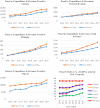An Assessment of Domestic Financing for Reproductive, Maternal, Neonatal and Child Health in Sub-Saharan Africa: Potential Gains and Fiscal Space
- PMID: 31512085
- PMCID: PMC7716850
- DOI: 10.1007/s40258-019-00508-0
An Assessment of Domestic Financing for Reproductive, Maternal, Neonatal and Child Health in Sub-Saharan Africa: Potential Gains and Fiscal Space
Erratum in
-
Correction to: Articles in Themed Issue: Health Financing in Sub-Saharan Africa.Appl Health Econ Health Policy. 2020 Dec;18(6):841-842. doi: 10.1007/s40258-020-00625-1. Appl Health Econ Health Policy. 2020. PMID: 33258103 Free PMC article.
Abstract
Background: Reproductive, maternal, neonatal and child health (RMNCH) remains an important public health objective. In sub-Saharan Africa (SSA), inadequate financial commitment continues to pose a major challenge to improving RMNCH outcomes. Understanding financing gains and potential fiscal space for RMNCH can therefore not be overemphasized.
Objective: This study sought to analyse the potential gains from increased domestic financing as a source for improving RMNCH outcomes in SSA. We also assessed, in addition to the potential gains, the potential fiscal space available for financing RMNCH in SSA.
Methods: Our study used panel econometric techniques to estimate gains from increased health financing in terms of RMNCH. We also reviewed tax system performance as well as debt sustainability to identify fiscal space potentials across countries.
Results: We found significant gains from both domestic and external financing. The estimated elasticities suggest that the gains from domestic public financing were much stronger. The fiscal space options identified include tax revenue performance improvements, improved public financial management, and borrowing, at least in the short to medium term. The results show that fiscal space from improved tax systems ranged from US$34.6 per capita in Uganda to US$310.6 per capita in Nigeria.
Conclusion: This result reinforces calls for increased domestic financing for health through innovations in domestic resource mobilization. Improving the performance of tax systems will be a step in the right direction, with possible long-term gains to the health sector.
Conflict of interest statement
Chris Atim, Eric Arthur, Daniel Malik Achala and Jacob Novignon, declare they have no conflicts of interest to report.
Figures

References
-
- World Bank Group . World development indicators. Washington, DC: World Bank Group; 2017.
-
- World Health Organization . World health statistics. Geneva: World Health Organization; 2015.
-
- United Nations . The sustainable development goals. New York: United Nations; 2015.
-
- United Nations . The millennium development goals. New York: United Nations; 2015.
-
- The Global Financing Facility 2016-2017 Annual Report. Country-Powered Investments for Every Woman, Every Child. Washington, DC: International Bank for Reconstruction and Development/The World Bank; 2017.
Publication types
MeSH terms
LinkOut - more resources
Full Text Sources
Medical
Research Materials

